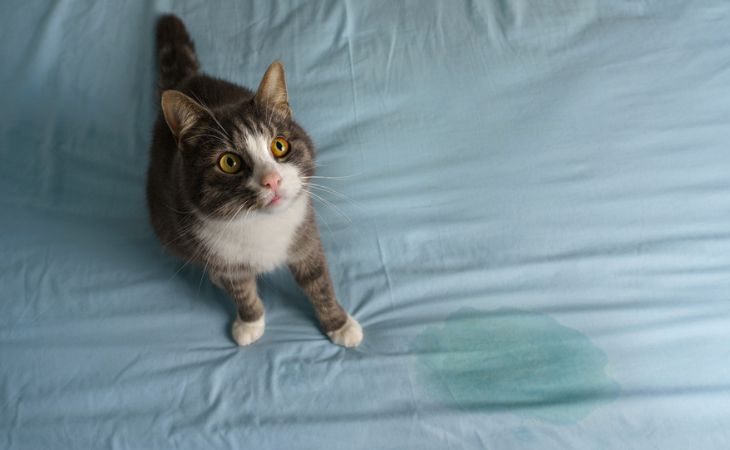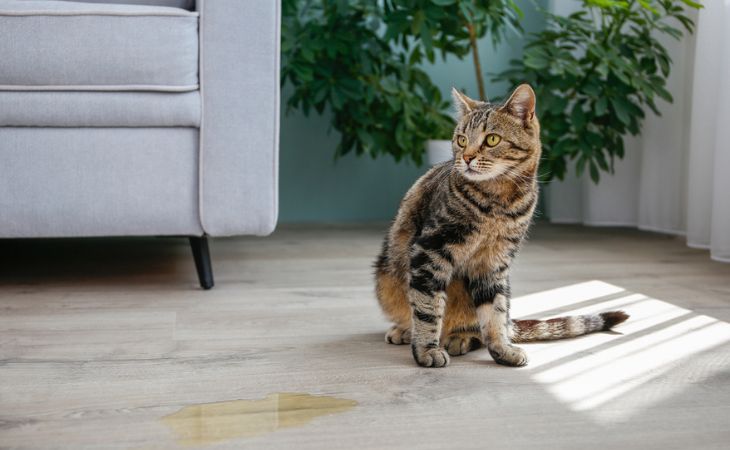Cats are notoriously clean, unlike some animals. If, despite your best efforts, your cat goes pee everywhere, there’s undoubtedly a reason for it. This behavioral problem can be interpreted in many ways. So why is your cat suddenly peeing everywhere? Is there anything you can do to remedy this behavioral problem?
What is causing my cat to go pee everywhere?
Similar to stool, urine is a message with several meanings for the animal concerned. If your cat goes pee everywhere, you need to observe them to know why and find the optimal solution for this problem.
This article might interest you: Why does my cat urinate on my clothes?
Differentiate between uncleanliness and urine marking
You need to distinguish between uncleanliness and urine marking. In this section, we will tell you everything you need to know about these two cases.
Uncleanliness
Uncleanliness is a multi-factor problem. It can indicate that the physical, mental, or emotional well-being of your cat is disturbed. When it comes to urine uncleanliness, the diagnosis needs to take into account:
- lower urinary tract diseases (ULTD),
- dehydration,
- constipation,
- neurological disorders,
- tumors.
Feline uncleanliness can also be caused by the environmental needs of your cat not being taken into account. For example, the location of your litter box could either be inappropriate (complicated to access, for instance) or there is not enough space for them. Bad management of your cat’s drinking and eating location, or scratching posts can also be the cause of urine uncleanliness.
Urine marking
Urine marking consists of letting out jets of urine on vertical surfaces. This allows cats to mark their territory. However, this does not prevent your cat from urinating in their litter box as well. Your cat can also often adopt behavior during periods of coupling. An unneutered cat can pee everywhere in order to attract the attention of females.
A problem with their litter box
If their litter box is dirty or scented, your cat may try to avoid this area. Ideally, you need to have a clean litter box with unscented litter for your cat. Also, make sure to scoop their litter clean every day and clean your cat’s litter box entirely at least once a week.
This article might interest you: How do I litter train my cat?
The litter box needs to be clean in order to attract your cat and give them the best living conditions. Just like you, your cat needs to have privacy when they go to the litter box. Therefore, it’s important to choose a good location for your cat’s litter box. It should preferably be in a calm area of the house. The litter box should ideally be out of sight, easy to access, and away from where they usually eat. The type of litter box you choose is also important.
Some cats prefer litter boxes with a sufficiently high rim or in the shape of a toilet house. For your cat’s comfort, opt for spacious models so that your cat can turn around easily and scratch. Once you’ve placed the litter box in your house, try not to change or get rid of it, as change can be unsettling for some cats.
A medical cause
The reason why your cat is peeing all over the house may be a medical problem. Indeed, certain kidney diseases can have an impact on your cat’s behavior. In the case of urinary tract infection, notably cystitis, cats pee very often and meow at the same time.
This condition is caused by inflammation of the bladder or urinary tract. Cystitis causes pain during urination. Blood can be seen in the urine. Kidney failure is also a disease that causes cats to pee in a disorderly way. If your cat urinates more than usual, they may have contracted diabetes mellitus.

Anxiety
If all the factors mentioned above aren’t the cause of your cat’s uncleanliness, anxiety could probably be the cause instead. Urinating outside the litter box can indicate that your feline is feeling anxious, and there are several signs of this:
- they eat very little,
- their pupils are dilated,
- they neglect their grooming, etc.
Cats are particularly sensitive to anxiety and the smallest change to their environment (moving, changing their litter, new decorations) can unsettle them. If your feline becomes anxious, they will pee everywhere.
How can I remedy my pet’s urinary problems?
The fact that your cat goes pee everywhere can make the house unpleasant and uncomfortable for both you and your cat. Fortunately, there are solutions to these behavioral problems.
Have your cat spayed or neutered to prevent urine marking
If your feline is not sterilized, there’s a good chance that the urinary marking could be because of this. In this case, you should consider spaying or neutering your cat. In principle, spaying is recommended before puberty, i.e. around 5 months. However, after sterilization, cats may still pee outside the litter box.
Do not punish your cat
There’s no need to punish your pet or even raise your voice at them. This will have the opposite effect on your feline. By reprimanding them, you’ll actually increase his discomfort and thus the cause of their urinary uncleanliness. Instead, turn to solutions to teach your cat hygiene and keep your home dirt-free.
For example, you can use natural repellents such as citrus peel, black pepper and mustard. Felines hate the smell of these. Put them in places where your cat is accustomed to urinating, so that they don’t return to relieve themself there.
Choose the right litter and maintain it properly
As you already know, choosing the right litter box is very important for your pet’s well-being. They need to feel at ease in this environment, which also preserves their privacy. For example, you can opt for an enclosed house with a door, and in particular an enclosed litter tray. Some felines are much more relaxed with a swinging door that can be pushed open.
Litter box cleanliness is important, as the cleanliness of this area must be impeccable. Regular cleaning is highly recommended, as cats like to urinate in clean areas. To reduce odors, use a chemical-free deodorizer. Baking soda is a good choice, as it helps to disinfect, descale and eliminate unpleasant odors. Don’t use essential oils, as some can be toxic to our feline friends.
This article might interest you: How do I choose the best type of cat litter?
Identify the causes of stress
One of the best ways to remedy your cat’s urinary malpractice is to observe their behavior and find out why they are becoming anxious. Once you’ve understood the source of their stress, you’ll be able to provide optimal solutions. To prevent your cat from getting anxious, try not to disturb your cat’s usual environmen. This could be by limiting how much your change the decor of your home. Showing your cat affection with cuddling, petting, and brushing can help reassure your pet and reduce their anxiety.
Consult your vet
If you’ve tried everything and the problems persist, it’s definitely time to consult a veterinarian. This animal health professional will examine your cat to determine their general condition. Tests are essential to rule out a urinary problem as the cause of this behavioral disorder.
Your vet can also help you assess your pet’s diet. Give them quality food and make sure they stay hydrated throughout the day. These precautions help prevent and treat feline urological syndrome. This condition affects both older cats and kittens.

